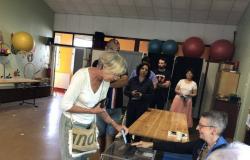EU leaders meeting at a summit agreed on Thursday to grant a second mandate to Ursula von der Leyen at the head of the Commission and entrust European diplomacy to a strong voice on Ukraine, the Estonian Kaja Kallas.
This agreement on key EU positions was quickly concluded, despite strong resistance from the Italian Giorgia Meloni and the Hungarian Viktor Orban.
The reappointment of Ursula von der Leyen must be confirmed by an absolute majority of MEPs: “There is one more step (…) I will seek the approval of the European Parliament after the presentation of my political roadmap for the next five years,” insisted the German conservative leader.
The outcome of this vote, expected in mid-July, is uncertain, with the usual coalition of conservative, socialist and liberal MEPs weakened following the June elections.
To embody the face of EU diplomacy against the backdrop of the war in Ukraine, the heads of state and government chose Estonian Prime Minister Kaja Kallas – a determined opponent of the Kremlin. This 47-year-old liberal will succeed the Spaniard Josep Borrell.
“It is an enormous responsibility in these times of geopolitical tensions, with the war in Europe and the growing instability in our neighbourhood as the main challenges,” said Ms Kallas, whose position will also have to be validated by MEPs.
“Kaja Kallas understands the risks coming from Russia and Belarus,” greeted the head of the Polish government Donald Tusk.
Finally, former Portuguese Prime Minister Antonio Costa was appointed new president of the European Council, the body bringing together member states. A year after his resignation over a corruption affair that was ultimately poorly substantiated, this socialist, renowned as a skillful tactician and pragmatist, will succeed the Belgian Charles Michel in December.
– “Very quick decision” –
These three candidates were the clear favourites following the agreement reached on Tuesday between six European leaders – including the French Emmanuel Macron and the German Olaf Scholz – belonging to the right-wing/social-democrats/centrists “grand coalition”, in the wake of the European elections.
Mr Scholz welcomed on Thursday “a very rapid and forward-looking decision”, in contrast to the laborious designation process which tore the Twenty-Seven apart five years ago.
However, Hungarian nationalist Prime Minister Viktor Orban on Thursday denounced the arrangement as “shameful”: “European voters have been deceived. (The traditional right) has formed a coalition of lies with the left and the liberals,” he said angrily upon arriving at the summit.
The head of the ultra-conservative Italian government, Giorgia Meloni, had for her part denounced an “oligarchy”, deploring having been left out of the negotiations between the three political groups.
“Their proposal is erroneous in method and substance. I have decided not to support it, out of respect for the citizens and the signal they have in the European elections” in June, she scathed. outcome of the summit. She abstained, according to a diplomatic source.
Many leaders had, however, shown themselves to be careful to spare her: if her support was not necessary – unanimity was not required – politically her voice counted.
“I think there was a broad consensus, and I am sure that a path will be (found) subsequently: I totally respect the position of Giorgia Meloni who represents an important country”, underlined Emmanuel Macron.
– Orban’s hopes –
Like Viktor Orban, Ms. Meloni intends to have more influence on the choices of the future executive in Brussels, following the surge of the radical and extreme right during the European elections this month. The Italian leader’s ECR group took third place from the centrist family of French President Emmanuel Macron in the European Parliament.
Rome claims “at a minimum” a vice-presidency of the European Commission, with an “important portfolio” to influence industrial and agricultural policy, according to its Minister of Foreign Affairs Antonio Tajani.
This meeting of the Twenty-Seven was held three days before early legislative elections in France for which the National Rally (far right) is largely in the lead.
Asked whether this election “cast a shadow” over the EU, Viktor Orban considered that on the contrary it brought a “ray of sunshine”, believing that “great things can happen (in France) on Sunday”.
For his part, Emmanuel Macron announced during a meeting with his liberal allies his wish to reappoint Thierry Breton as French member of the Commission, according to European sources. He has been Commissioner for the Internal Market since 2019, a vast portfolio that includes digital and industry.
The leaders of the Twenty-Seven also endorsed on Thursday the “strategic agenda” setting the bloc’s priorities for the next five years, emphasizing security, defense, competitiveness and the fight against irregular immigration.
Among the other key positions in the EU, the Maltese conservative Roberta Metsola appears favorite to win a second two-and-a-half-year term as president of the European Parliament, mid-July in Strasbourg.





